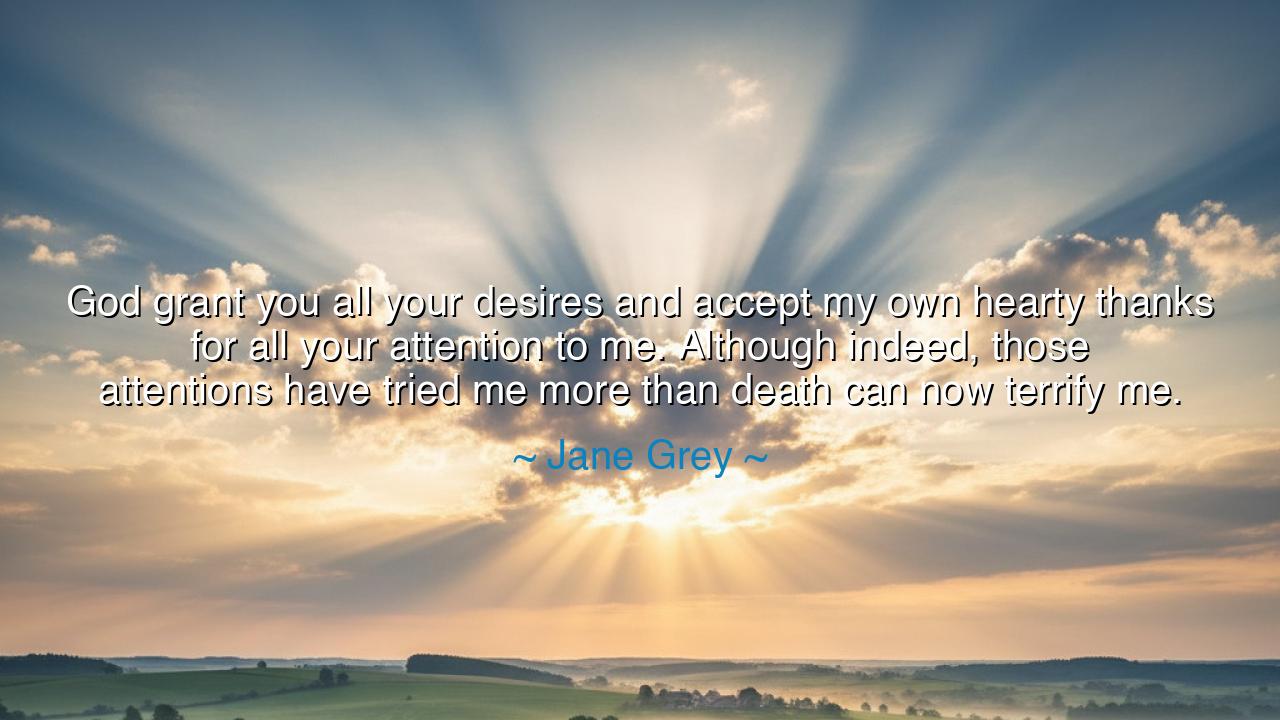
God grant you all your desires and accept my own hearty thanks
God grant you all your desires and accept my own hearty thanks for all your attention to me. Although indeed, those attentions have tried me more than death can now terrify me.






The young and tragic Lady Jane Grey, once called the “Nine Days’ Queen” of England, wrote in her final letter before execution: “God grant you all your desires and accept my own hearty thanks for all your attention to me. Although indeed, those attentions have tried me more than death can now terrify me.” These words, born of grace in the shadow of death, reveal the soul of a woman whose faith was unbroken, whose dignity remained unstained, and whose courage shone brighter than the crown that destroyed her. In this single sentence lies the eternal conflict between gratitude and sorrow, between the courtesy of life and the inevitability of death. Jane Grey’s tone is neither bitter nor fearful — it is serene, resolute, and imbued with the wisdom of one who has glimpsed eternity.
To understand her words, one must understand her fate. Jane Grey, though barely seventeen, was thrust upon the throne by political schemers after the death of King Edward VI. She never sought power, nor desired glory; her soul was one of study, prayer, and quiet contemplation. Yet the ambitions of others made her a pawn in a game of dynastic struggle. Within days, her reign ended; she was imprisoned by Queen Mary and condemned to die. It was during this imprisonment that she penned the line above — not in defiance, but in clarity. Her “thanks” were sincere, yet her confession that those attentions had “tried” her more than death reveals the weariness of a spirit tested beyond endurance. She feared not death, but the cruelty of life’s manipulations.
Her words echo the wisdom of the ancients, who knew that death is not the true terror — it is the slow suffering that precedes it. For Jane, the kindness of her captors, the pity of her friends, the hollow sympathy of courtiers — all these “attentions” were daggers cloaked in gentleness. She had been praised, flattered, and betrayed in turn; and in the end, she stood utterly alone. Her statement, “more than death can now terrify me,” is not despair, but transcendence. It is the declaration of one who has seen the emptiness of worldly promises and found strength in spiritual truth. Death could no longer frighten her, for she had already endured the death of innocence and trust.
There is something profoundly heroic in such acceptance. In her words we hear the same calm that filled the lips of Socrates, who, before drinking the poison hemlock, told his disciples not to weep, for he was merely departing to a better place. Like him, Jane faced her end not as a victim but as a philosopher of faith. The heart that could forgive, thank, and bless others while walking toward the scaffold is a heart that has conquered both fear and resentment. She became, in her final hour, a mirror of divine composure — the triumph of spirit over circumstance.
The origin of this quote lies in her last correspondence from the Tower of London, where she awaited execution in 1554. Surrounded by enemies and separated from all she loved, she refused to curse her fate. Her education, steeped in Scripture and the classics, had taught her that life’s trials are but a moment compared to the eternity of the soul. When she wrote, “God grant you all your desires,” she was not being ironic — she was expressing genuine goodwill, even toward those whose actions had caused her pain. It was forgiveness distilled into language. But in the same breath, she confessed her exhaustion — that the burden of human sympathy, the fragile kindness of others, had wounded her more deeply than the executioner’s axe ever could.
Her letter is therefore not just the farewell of a queen — it is the testimony of a soul purified by suffering. It teaches that there comes a point when fear itself dies, when the soul, stripped of illusion, stands free. The trials that once tormented her became the fire through which she attained peace. When life’s “attentions” — its manipulations, demands, and pretenses — are finally seen for what they are, the human heart can rest. Her serenity before death reminds us that acceptance is stronger than resistance, and that the soul’s calm is the greatest rebellion against cruelty.
What lesson, then, shall we carry from her words? It is this: true peace is not the absence of pain, but the mastery of it. When life tests you, when others’ expectations or deceits weigh upon you, remember Lady Jane Grey — young, fragile, yet unyielding. Let not the fear of loss or judgment enslave your spirit. Be thankful where you can, but never let false kindness distract you from truth. Face hardship as she faced death — with grace, clarity, and faith that something greater awaits beyond the storm.
Thus, Jane Grey’s final words transcend time, whispering wisdom to all who suffer unjustly or bear the burden of others’ ambitions. Her courage teaches us that while power fades, and life itself may crumble, the soul that forgives and accepts cannot be destroyed. To say, “It no longer terrifies me,” as she did, is to declare freedom — the freedom of one who has already passed through the fire and found peace in the eternal light beyond fear. And so her voice, gentle yet unbreakable, endures through the centuries — a testament to the truth that death holds no terror for the heart that has already learned how to live with grace.






AAdministratorAdministrator
Welcome, honored guests. Please leave a comment, we will respond soon